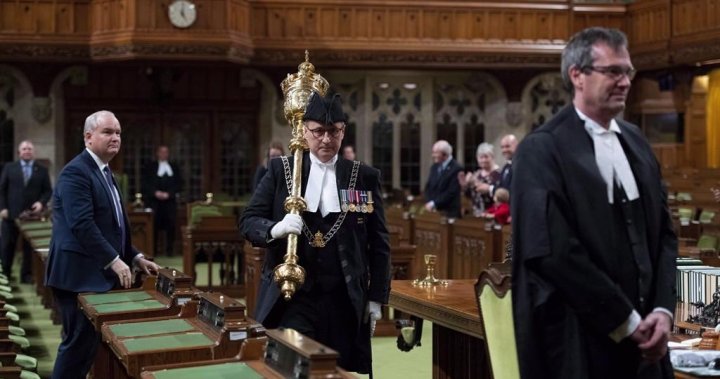A senior House of Commons security official says two potential employees in the last six months have been denied employment in Parliament over concerns of foreign state influence.
Patrick McDonnell, the sergeant-at-arms and corporate security officer with the House of Commons, told a federal inquiry Tuesday that he has denied employment to a “handful” of people over the last five years because they were suspected of being influenced by a foreign state.
McDonnell also told the foreign interference commission that there has also been a sharp increase in secondary interviews with prospective staffers, referred to as “resolution of doubt” interviews, in recent years.
Resolution of doubt interviews are conducted when preliminary security screening and “loyalty to Canada” investigations raise questions about a potential employee. They involve McDonnell or his staff meeting with the prospective staffer to clear up any lingering questions about their background.
“It’s increased significantly. I believe in 2019 we conducted 10 resolution of doubt interviews. In 2023, 128 approximately,” McDonnell said.
McDonnell was first named sergeant-at-arms, an appointment by the federal cabinet, in 2019 and re-appointed earlier this year. The position carries a number of ceremonial duties, but also works with the Parliamentary Protective Service on House of Commons security.

Get daily National news
Get the day’s top news, political, economic, and current affairs headlines, delivered to your inbox once a day.
McDonnell was speaking during the second phase of the inquiry, led by Quebec appeal court judge Marie-Josée Hogue, into the ongoing issue of foreign interference in Canada’s democratic institutions.
Hogue has so far determined that while both the 2019 and 2021 general elections saw instances of foreign state influence campaigns, those activities did not compromise the integrity of the results. In both elections, Hogue concluded earlier this year, Canadians determined the winning party.
But her preliminary report, released in May, concluded that a handful of candidates in the 2019 election “appeared willing” to go accept help from foreign states. And the alleged foreign interference operations were not limited to political candidates.
The Hogue inquiry reported that a group of “known and suspected” affiliates of the People’s Republic of China (PRC) worked to advance Beijing’s interests, and that group had a “direct connection” to 11 political candidates and 13 political staff members.
Some of those candidates and staffers “appeared willing to cooperate in foreign interference-related activity while others appeared to be unaware of such activity due to its clandestine nature.”
Staffers on Parliament Hill serve a variety of roles for their MPs and senators – everything from fielding calls from constituents and managing the politicians’ offices and schedules, to attending meetings or interviews. Because of the at-times gruelling nature of the job, they typically occupy a place of trust within a politician’s Ottawa circle.
That can make them an attractive target for foreign actors looking to influence Canadian politicians.
They also go through security screening by both the RCMP and the Canadian Security Intelligence Service (CSIS) before they’re hired and given access to parliamentary networks, McDonnell told the inquiry.
The RCMP conducts a basic criminal background check on all prospective staffers, while CSIS runs a “loyalty to Canada” screening. New staffers are also scrutinized over any publicly available information investigators can dredge up, also known as “open source” intelligence.
“Loyalty to Canada investigations include a review of an individual’s last five years of history. These investigations can be difficult, particularly if the candidate has resided outside the country, is new to Canada or is from a country that is of concern to Canada,” an interview summary, published by the inquiry Tuesday morning, read.
In the event of any concerns or incomplete information from the new employee, McDonnell’s office can ask for a secondary “resolution of doubt” interview in order to “make sure they take the proper measures to protect their networks and their institutions.”
The current phase of the Hogue inquiry is expected to run until Oct. 16, and hear more testimony from top security and intelligence officials, senior bureaucrats and cabinet ministers, including Prime Minister Justin Trudeau.
Hogue has until the end of the year to produce a final report on foreign interference in Canadian elections.
© 2024 Global News, a division of Corus Entertainment Inc.




